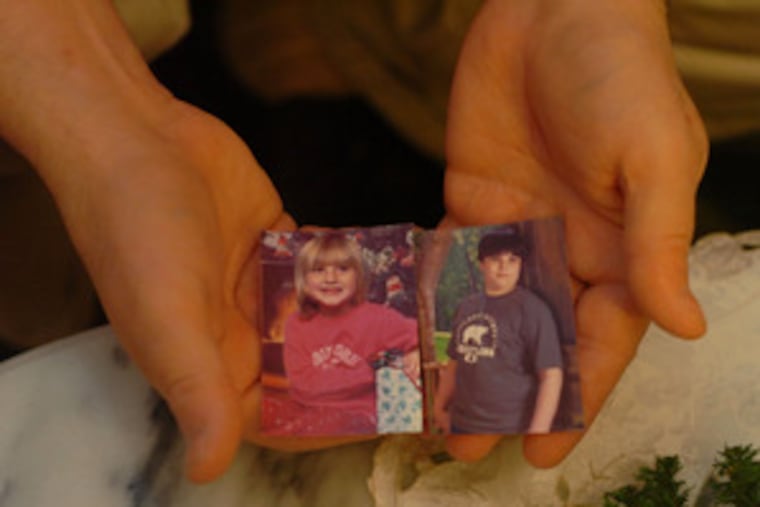Annette John-Hall | Forgiveness triumphant over hatred
Charles and Eileen Bennett wouldn't wish this on their worst enemy - the unending nightmare of horror, grief and pain that has blanketed them like a thick fog since their daughter, Wendy, and grandchildren, Melanie and Scottie, were murdered a year and a half ago.

Charles and Eileen Bennett wouldn't wish this on their worst enemy - the unending nightmare of horror, grief and pain that has blanketed them like a thick fog since their daughter, Wendy, and grandchildren, Melanie and Scottie, were murdered a year and a half ago.
A retired Millville, N.J., cop, Charles, whom everybody knows as Chick, took an eye-for-an-eye view of justice. After all, he had spent 25 years getting criminals off the streets. Gas 'em, electrocute 'em, inject 'em - any way the state chose to take out those creeps was OK by him.
But grief can be unpredictable. It's an emotional free fall that can scatter you in a zillion different directions.
Sometimes in directions you'd never think you would take.
Like joining New Jerseyans for Alternatives to the Death Penalty.
That's why the Bennetts consider what Gov. Corzine did this week - signing into law a measure to end the death penalty in New Jersey - a bittersweet Christmas gift.
"I can't think of a better way to honor Wendy, Scottie and Melanie than this," says Eileen, who was technically Wendy's stepmother, but whose love for Wendy and the kids ran blood-deep. "I'm praying that this moves on to other states."
Eileen describes her family's ordeal as "a stroll through hell." Yet somehow she manages to recount the worst time of their lives with the deliberate dispassion of the newspaper reporter she once was.
On May 26, 2006, Scott McCarter, 40, Wendy's husband and the children's father, murdered them the day before he was supposed to take the stand for to face charges of sexually assaulting Wendy's daughter Amanda, who was 16 at the time.
Horrible end
That night, McCarter shot and killed Wendy, 35, and Melanie, 6, as they lay curled up together, sleeping. Then he went into Scottie's room, killing the sleeping 12-year-old, and then killed himself.
Some could argue it would be easy for the Bennetts to take an anti-death-penalty stance because McCarter's suicide conveniently took the decision out of their hands.
That was not the case, says Chick.
"I was always for the death penalty, but when this happened, I seriously thought that, had he lived, I would not want to see him put to death," he says. "It would have been a lot more difficult if he would have been in prison. And he knew it, because that's where he was headed. That's why he killed himself."
Eileen is a Catholic who had always been against the death penalty with the caveat that "it will never happen to me."
Trying to channel her grief, she remembered interviewing Lorry Post, the founder of New Jerseyans for Alternatives to the Death Penalty.
"When Lorry talked, you can't help but be inspired by that kind of forgiveness."
She believes he helped her husband change his mind.
Unlikely advocates
Gov. Corzine, in making New Jersey the first state to outlaw the death penalty, had to have been swayed by the signatures of 62 murder victims' families calling for the repeal of capital punishment - the unlikeliest of advocates. I'm guessing all 62 had different reasons.
They also sympathize with Richard and Maureen Kanka, whose daughter Megan was raped, strangled and suffocated by Jesse Timmendequas - one of eight inmates currently on New Jersey's death row - as well as all the other families who are pro-death penalty.
"Just another slap in the face to the victims," Richard Kanka said Monday.
There's no right way to feel, no right position to take. You can't say how you'll feel until you're faced with such tragedy.
But Post, of Mount Laurel, whose daughter Lisa, 29, was stabbed to death by her enraged husband in 1988, says holding onto the hope that the death penalty would be enforced was like waiting on death row yourself.
"It keeps you in the mode of hatred and you can't begin the grieving process."
Adds Eddie Hicks, whose daughter Jamila, 26, was shot and killed by a male acquaintance in 2000: "I don't think the government should be in the business of killing people."
"They're doing it in my name and with my taxes, therefore I'm a party to it," the retired Atlantic City firefighter says.
For all the moral and economic arguments made in favor of doing away with capital punishment - that it costs the state hundreds of millions in appeals; that in New Jersey it's an idle threat because no inmates have been executed in 44 years; that studies prove it's not a deterrent to crime, and that it is applied unfairly and is by no means mistake-free - the reasons most families give are far more personal.
"To understand how we feel, you have to understand how Wendy and the children were," Chick says. "It was not anywhere in the fiber of their nature to harm, never mind kill, anything. Once, their dog got hit by a car in front of their house. Wendy spent $2,500 to save that dog - and they weren't rich people.
"It would have been an insult to her, had he lived, if we had asked prosecutors for the death penalty."